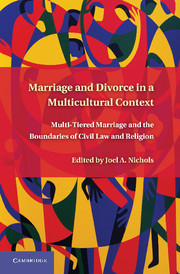 Marriage and Divorce in a Multi-Cultural Context
Marriage and Divorce in a Multi-Cultural Context Book contents
- Frontmatter
- Contents
- Detail Contents
- About the Editor
- List of Contributors
- Preface
- Permissions
- Introduction
- 1 Multi-Tiered Marriage
- 2 Pluralism and Decentralization in Marriage Regulation
- 3 Marriage and the Law
- 4 Unofficial Family Law
- 5 Covenant Marriage Laws
- 6 New York’s Regulation of Jewish Marriage
- 7 Political Liberalism, Islamic Family Law, and Family Law Pluralism
- 8 Multi-Tiered Marriages in South Africa
- 9 Ancient and Modern Boundary Crossings Between Personal Laws and Civil Law in Composite India
- 10 The Perils of Privatized Marriage
- 11 Canadian Conjugal Mosaic
- 12 Marriage Pluralism in the United States
- 13 Faith in Law? Diffusing Tensions Between Diversity and Equality
- 14 The Frontiers of Marital Pluralism
- Index
- References
7 - Political Liberalism, Islamic Family Law, and Family Law Pluralism
Published online by Cambridge University Press: 05 November 2011
- Frontmatter
- Contents
- Detail Contents
- About the Editor
- List of Contributors
- Preface
- Permissions
- Introduction
- 1 Multi-Tiered Marriage
- 2 Pluralism and Decentralization in Marriage Regulation
- 3 Marriage and the Law
- 4 Unofficial Family Law
- 5 Covenant Marriage Laws
- 6 New York’s Regulation of Jewish Marriage
- 7 Political Liberalism, Islamic Family Law, and Family Law Pluralism
- 8 Multi-Tiered Marriages in South Africa
- 9 Ancient and Modern Boundary Crossings Between Personal Laws and Civil Law in Composite India
- 10 The Perils of Privatized Marriage
- 11 Canadian Conjugal Mosaic
- 12 Marriage Pluralism in the United States
- 13 Faith in Law? Diffusing Tensions Between Diversity and Equality
- 14 The Frontiers of Marital Pluralism
- Index
- References
Summary
Western democracies in recent years have witnessed dramatic (and often highly charged) debates regarding Islamic law, women, and the limits of pluralism in a liberal polity. Perhaps the most relevant of these for the issue of family law pluralism was the “Shari‘a Arbitration controversy” of Ontario, Canada, of 2004–2005. Although Jewish, Christian, and Isma‘ili Muslim (a relatively small sect of Shi‘a Muslims who follow the Agha Khan) residents of Ontario had long made use of private arbitration for the resolution of intracommunal family disputes, when a group of Sunni Muslims announced their intent to establish a mechanism to allow orthodox Muslims to arbitrate their family law disputes in accordance with their understanding of Islamic law, a transatlantic controversy erupted that was resolved only when Ontario took the drastic step of prohibiting the arbitration of all family law disputes in which the arbitrator purported to apply non-Canadian law. Great Britain, too, experienced its own moment of Islamic law anxiety when the Archbishop of Canterbury suggested that British commitments to pluralism might require the English legal system to recognize certain aspects of Islamic law. That controversy was subsequently heightened when it was revealed that British Muslims had already set up judicial councils that engaged in legally binding arbitration of family law disputes pursuant to British law permitting binding arbitration.
Given the general anxiety surrounding Islamic law in Western democracies, the fact that fear of Islamic law should be a substantial stumbling block to increasing legal pluralism in the domain of family law is ironic given the pluralistic nature of Islamic law’s regulation of the family. At the same time, legal recognition of family law pluralism is not without its genuine risks: The rules of Islamic family law, as well as the rules and traditions of other subcommunities within a liberal polity, are not substantively equivalent to the generally applicable rules of civil law. Any system of family law pluralism within a liberal polity, therefore, must establish institutional mechanisms to ensure that legal pluralism does not become a tool to deprive individuals of their rights as citizens.
- Type
- Chapter
- Information
- Marriage and Divorce in a Multi-Cultural ContextMulti-Tiered Marriage and the Boundaries of Civil Law and Religion, pp. 164 - 199Publisher: Cambridge University PressPrint publication year: 2011


